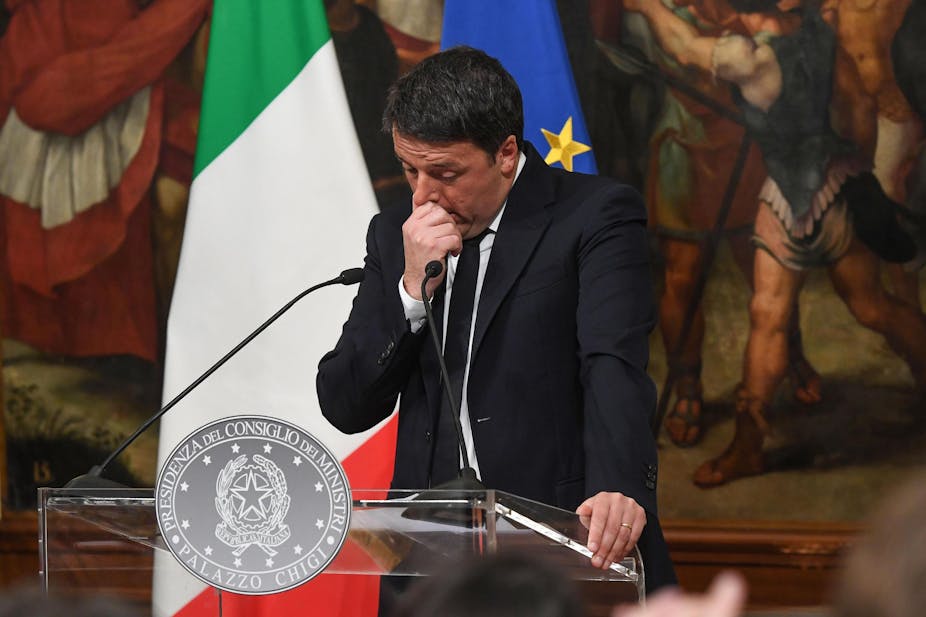After staking his career on the promise that he would either “change Italy or change jobs”, Matteo Renzi has resigned as prime minister. With 60% of the popular vote going against his political reforms in a referendum that became all about Renzi’s future, he was left with no choice but resignation. And, following hot on the heels of political upheavals in the UK and US, markets reacted accordingly.
The initial financial shock waves have not been too bad. Milan’s stock market, the FTSE MIB, fell and the euro dipped to lows against the US dollar that were last seen at the height of Greece’s economic crisis (US$1.0505). The euro has since rebounded, as have European stocks more broadly. By banning opinion polls two weeks before the referendum, Renzi left Italian markets confused and the FTSE MIB rose in the build-up to the vote. This accentuated the sharp falls when the “No” victory was delivered.
Arguably the rejection of Renzi’s reforms does not signal too much uncertainty. After all, it means sticking with the status quo and not overhauling a political system that has managed for the last 60-odd years.
So Renzi resigns and Italy’s president, Sergio Mattarella, will nominate a successor. They are unlikely to look very different to their technocratic predecessor, but it is only a matter of time before a general election is called and then we’ll jump on the panic merry-go-round once again.
Panic on pause
Meanwhile, uncertainty simmers below the surface – and market stability should be enjoyed while it can. The last few months have shown the world how uncomfortable uncertainty is. Whether it’s what Brexit actually means (and whether it will be “hard” or “soft”) or concern over what a Trump presidency will actually look like, financial markets have made it clear that they don’t like not knowing.
Italy’s problem is its banks. A victory for Renzi might have helped a little in the short-term. But the country remains plagued by nearly €400 billion of non-performing debts that are largely held by retail investors. The situation is not helped by a moribund economy which has too weak an SME sector to drive demand for performing loans.
Monte dei Paschi – Italy’s third largest bank – is the current poster child of this failing system. It needs to raise €5 billion and sell off €28 billion of bad loans to stay afloat – albeit still leaking badly. It was part of the way through a complex plan negotiated by Renzi with the EU to raise these funds, but the referendum and Renzi’s resignation throws this into question.

If Monte dei Paschi fails, things will start to get nasty. This would likely lead to a loss of market confidence in Italy’s wider banking system and could trigger a series of market failures.
This would be incredibly bad news for Italians. The term “retail investor” means you and me – individuals who invest as bond holders in the Italian banks rather than save with them. Under EU rules introduced after the financial crisis and designed to prevent taxpayers bailing out failing banks, bond holders need to “bail-in” (lose some of their money) before the taxpayer “bails out”.
In France and Germany, that’s great. There, big institutional investors hold the majority of loans, so if a bank needs rescuing, they’d lose out before the taxpayer. In Italy, however, it’s the retail investors that must bail in. This means ordinary people losing 10-20% of their savings invested in bank bonds, before taking part in the second stage of the rescue as taxpayers. A real double whammy.
There will likely be a fudge – for now – to maintain unity within the EU during this critical period. But the problem won’t be solved. Italy is the third largest economy in Europe and by any measure its economy is in trouble.
The Italian people were focused on what was best for them from a political standpoint, but they could end up paying the price if their banking system fails as a result. And the uncertainty regarding their future leaders means that the outside world can only estimate whether the future of the eurozone is in jeopardy. If the anti-euro Five Star Movement continues to gain ground, it could mean full-blown crisis.

